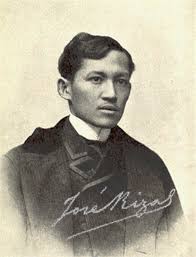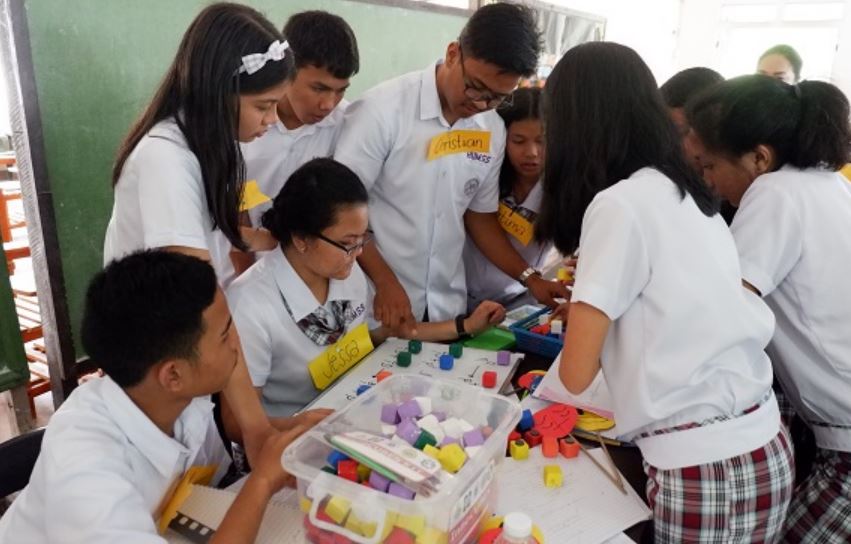Name: Katrina Escobanas Date: 04-17-16
Grade & Section: VII-Zircon
 The story starts when the main character, whose name was not mentioned, returns home and sees Abelardo, his younger brother, shining the main character’s black shoes. When Abelardo was finished, he also took his brother’s nylon cord suit and wore it.
The story starts when the main character, whose name was not mentioned, returns home and sees Abelardo, his younger brother, shining the main character’s black shoes. When Abelardo was finished, he also took his brother’s nylon cord suit and wore it.
When the older brother noticed Abelardo hadn’t made supper, he chose not to reprimand him for he knew how much Abelardo looked forward to the upcoming dance. Ignoring his muscles screaming in protest, he rose and lit the kerosene.
They ate roasted dried squid for supper. Abelardo ungratefully ate a small portion of the hard-earned meal before he inspected his face in the mirror. He rumbled on about a pesky pimple on his right cheek before putting on his suit and asking his older brother do his tie.
The younger brother begged the older for ten pesos and the older continuously refused if only to have the pleasure of hearing his brother beg. Abelardo jabbed a finger at his brother’s trunk and told him to open his alcancia. However, he was refused for the money was for his school fees and the older brother eventually gave him 5 pesos.
When Abelardo got back in the middle of the night, he brought Ligaya, who was supposed to be tucked in her bed in the dormitory right about this time. Abelardo led her in before addressing his brother.
According to his brother, Ligaya was locked out because she got back past curfew. He had already warned Abelardo about that yet his younger brother didn’t listen. There was no other place she could go and so she had to sleep there.
Abelardo insisted on sleeping on the same side of the room with Ligaya and took his brother’s cot, too. At night, the main character couldn’t sleep well because their mumblings and stirrings kept him awake. When he woke up, Ligaya was not in the room.
Abelardo beamed and told him he took back Ligaya early. The older brother sliced his breakfast and told him he didn’t want this to happen again. Abelardo reasoned that he was too old to understand and have fun and that he should let him do what he wants with Ligaya.
The older brother threatened that if he brought her back there again, he would kill him. Abelardo cynically laughed and accused his brother of being jealous of him for having slept with Ligaya. The knife narrowly missed his head and Abelardo brought his trembling hands up, realizing mistakenly that his brother would really kill him for sleeping with Ligaya.
The older brother placed the roasted squid and sliced tomatoes in his lunch box and asked his brother if this was how he was going to repay him for slaving for him all his life. With the both of them mad with rage, they couldn’t see eye-to-eye, as they’d always had, and the younger hissed that he would not need a cent of his brother’s money anymore because he was leaving before he could kill him.
The main character went to work but muffed orders and had no greeting for the sick. Feeling guilty, he returned home by nine and hoped his brother would still be at home. He found a large wooden trunk in front of the door and if his brother was going to use it, perhaps he was still in the house.
When he found Ligaya inside, he knew his younger brother had, indeed, ran away from home. He was too shocked to remember manners so he asked her what she was doing in the house.
Her eyes were red from crying. She told him she must stay here with Abelardo for the dorm refused to take her back. He told her he wasn’t living there anymore because he had gotten mad at him, causing him to leave.
Ligaya insisted she had to stay there for her folks would kill her if they found out. She asked if Abelardo would return and he nodded, although he didn’t know where he went. He noticed his trunk had been forced open and found an empty space where his bamboo bank had been. At first he was angry but the feeling turned quickly to relief, knowing his brother wouldn’t starve out there.
He pulled out the blanket and strung it out the room again, pushing his cot to her side of the room. Ligaya asked if she was the reason they fought, although she already knew the answer. He told her it was over and that Abelardo was gone. He felt blood rush to his face as his anger started to rise but he pushed it back down.
Ligaya wept that she wanted to explain last night but couldn’t for he had put that horrid thing—the blanket—up. She pulled it down and he turned to leave. He was not going to take care of his brother’s woman. He was determined to live his life the way he wanted it to go from now on. However, Ligaya held his hand and said, trying to smile, “I’ll prepare lunch for you, if you care to come home for it.”
July 27, 1952
What is the main conflict of the story?
Abelardo brought a woman home and was making a slave out of his brother.
Character Analysis
Main Character: He is very caring to his brother and continuously gives way for him. He is easily persuaded and blind from love that sometimes it’s strength but oftentimes a weakness. He puts his brother’s interests higher than money, as shown when it was mentioned that he would willingly cut his expenses if he needed to give his brother 10 pesos. He may inflict physical harm when provoked. He would have liked to continue his life with Abelardo but destiny doesn’t allow it.
Abelardo: He is selfish and rude. He sweet-talks his brother to get his way yet insults him for absurd reasons. He doesn’t have a shed of dignity, as shown when he continuously berates his brother for living without a woman, albeit knowing it was because of him. He is self-centered. He wants to live a carefree life painting and being with Ligaya.
Ligaya: She is very beautiful, albeit a rule-breaker. She is careless as shown when she spent too much time with Abelardo and ended up locked out from the dorm. She wants to stay in Abelardo’s place. However she had to beg the main character to let her stay since Abelardo ran away from home.
What is the theme of the story?
It talks about the common problems of Pilipinos in the olden times that persistently continue until this day. It is how Pilipinos deal with unfortunate circumstances.
Imagery and Symbolisms
Jose showed his adeptness in imagery when he described how the house looked like in general and again when he described the room Abelardo and his brother shared. Other examples are when he described he could not do his work well, Ligaya’s crying form—particularly her dress—, and how he groped for his missing bamboo alcancia. He is also adept at symbolisms as shown when he described anger as blood rushing to the main character’s face. Other examples include when he described the sounds of making love as stirrings and mumblings, the loss of his bamboo coin bank as the departure of his brother, the blanket as a wall separating them, and the loss of the blanket as their worlds becoming one.
Background
José attended the University of Santo Tomas after World War II, but dropped out and plunged into writing and journalism in Manila. In subsequent years, he edited various literary and journalistic publications, started a publishing house, and founded the Philippine branch of PEN, an international organization for writers. José received numerous awards for his work. The Pretenders is his most popular novel, which is the story of one man’s alienation from his poor background and the decadence of his wife’s wealthy family.
Connection
José Rizal’s life and writings profoundly influenced José’s work. The five volumes of Rosales Saga, in particular, employ and interrogate themes and characters from Rizal’s work. Throughout his career, José’s writings espouse social justice and change to better the lives of average Filipino families. He is one of the most critically acclaimed Filipino authors internationally, although much underrated in his own country because of his authentic Filipino English and his anti-elite views.



